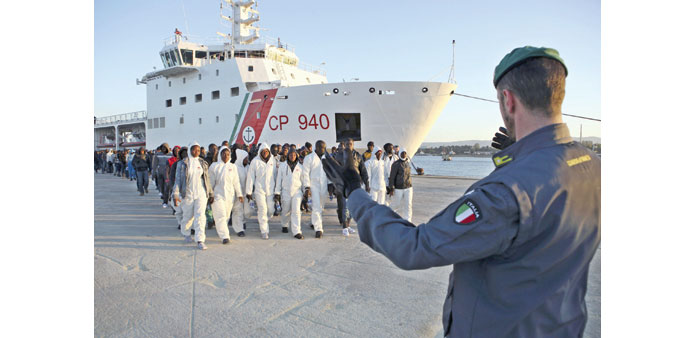AFP/Rome
Italian police said yesterday that they had arrested a group of African migrants after witnesses said they threw 12 passengers overboard following a row about religion on a boat headed to Europe.
The deadly dispute, which saw a group of Muslim passengers allegedly attack a group of Christian passengers, coincided with reports of a new migrant drowning tragedy.
Four days after a migrant shipwreck off the coast of Libya, in which 400 people are believed to have died, another 41 migrants were missing feared drowned yesterday after their dinghy sank en route to Italy, Italian media reported.
The stricken vessel was spotted by a plane, which alerted the Italian coastguard but by the time a navy ship arrived at the spot only four passengers were found alive, the reports quoted the police and aid agencies as saying.
The four survivors, who came from Nigeria, Ghana and Niger, said that they were part of a group of 45 people that set sail from Libya.
A separate group of migrants rescued by an Italian vessel related a deadly stand-off over religion in their dinghy, which ended in 12 Nigerian and Ghanaian passengers being drowned, the police said.
The victims were “of Christian faith, compared to their attackers who were of Muslim faith”, police in the Sicilian port of Palermo said in a statement.
Fifteen migrants were arrested on suspicion of “multiple aggravated murder motivated by religious hate”, the police statement added.
The incident aboard the vessel, which was carrying about 100 migrants, took place in the Strait of Sicily, between Tunisia and Italy.
According to a group of Nigerian and Ghanaian survivors, a fight broke out over religion, with a group of Muslim passengers threatening the Nigerians and Ghanaians after they declared themselves to be Christians.
“The threats then materialised and 12 people, all Nigerian and Ghanaian, are believed to have drowned in the Mediterranean,” the police statement added.
The remaining passengers were rescued and brought to Palermo, where the 15 alleged attackers, who came from Ivory Coast, Mali and Senegal, were arrested.
The boat, like many of the claptrap vessels flooding Italy’s shores each week with migrants fleeing conflict and poverty in Africa and the Middle East, had set out from Libya on Tuesday, according to the survivors.
The police statement said that the distraught Nigerians and Ghanaians told a “dreadful” story of their struggle to escape with their lives “by forcefully resisting attempts to drown them, forming a veritable human chain in some cases”.
Some passengers had taken photographs of the incident, judicial sources who described the accounts as “coherent” told Italian media.
The International Organisation for Migration (IOM) said it had received reports of “a fight between different groups – maybe for religious reasons ... on one of the boats rescued some days ago”.
Italy meanwhile pleaded for more help from other European Union countries to rescue the migrants risking their lives to reach Europe and to share the burden of accommodating the arrivals.
Italy is not the final destination of most of the tens of thousands of migrants who risk their lives each year in search of a better life in Europe but as their first port of call it is saddled with handling all their asylum requests as well as saving those in danger from a watery grave.
“Ninety per cent of the cost of the patrol and sea rescue operations are falling on our shoulders, and we have not had an adequate response from the EU,” Foreign Minister Paolo Gentiloni told the daily Corriere della Sera.
“And then there is the difficult issue of knowing where to send those rescued at sea – to the nearest port? To the country where their boat came from? The EU has to respond clearly to these questions,” Gentiloni said.
Amnesty International said much of the responsibility for the crisis rested with Brussels.
“In demanding an end to the Mare Nostrum rescue operation that saved 170,000 lives, and replacing it will a surveillance mission, Triton, the EU has turned its back on its responsibilities and clearly threatens thousands of lives,” said Jean-François Dubost, Amnesty’s displaced persons director in Paris.
Gentiloni said that in order to stem the tide, the EU also had to tackle why the migrants were trying to make the perilous journey to Europe.
He said it needed to “work on the regions of origin” of the wave of refugees, including “Syria, the Horn of Africa and central Africa”.
Italy believes the only way the flow can be slowed is to tackle the chaos caused by the civil war in Libya, from whose unpoliced ports most of the migrant boats are coming.
Gentiloni called for a more inclusive Libyan government, something which the United Nations also wants.
“We don’t have months and months (to sort this out),” he warned. “The double risk of an advance of the Islamic State group in Libya and the waves of migrants means we are in a race against the clock.”
In the face of these threats, Gentiloni raised the possibility of more drastic international action including “targeted anti-terrorist strikes for example to help the anti-Islamic State coalition, and action against human trafficking and more collaboration (with African and Middle Eastern) countries so that refugees can be welcomed in neighbouring countries”.

Migrants from a Coast Guard boat follow instructions after disembarking yesterday in the Sicilian harbour of Augusta.
